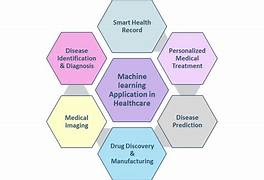Machine Learning Applications in Healthcare:
Outline
- Introduction
- Definition of Machine Learning (ML) and its growing importance in healthcare.
- Brief mention of key areas where ML is making an impact.
- Applications of Machine Learning in Healthcare
- Diagnostics and Early Detection
- Disease prediction and early diagnosis.
- Examples: Cancer detection, Alzheimer’s prediction.
- Personalized Medicine
- Tailoring treatments to individual patients using ML algorithms.
- Use of genetic data for precision medicine.
- Drug Discovery and Development
- Accelerating drug research and clinical trials.
- Predicting drug efficacy and side effects.
- Medical Imaging and Analysis
- AI in radiology, pathology, and other image-based diagnoses.
- Examples: Identifying fractures, tumors, and other abnormalities.
- Administrative Workflow Optimization
- Automating scheduling, billing, and patient data management.
- Enhancing hospital efficiency.
- Predictive Analytics and Public Health
- Forecasting disease outbreaks and resource allocation.
- Real-time data insights for global health management.
- Remote Monitoring and Wearable Devices
- Integration with IoT for chronic disease management.
- Continuous patient monitoring and alerts.
- Diagnostics and Early Detection
- Benefits of Machine Learning in Healthcare
- Improved accuracy in diagnoses.
- Faster treatment processes.
- Cost reduction in healthcare delivery.
- Challenges and Limitations
- Ethical concerns: Data privacy and security.
- Bias in ML algorithms.
- Need for high-quality data and interoperability issues.
- Future of Machine Learning in Healthcare
- Emerging trends: AI-powered robotics, telemedicine enhancements.
- Long-term impact on patient outcomes and healthcare accessibility.
- Conclusion
- Summarizing ML’s transformative role in healthcare.
- Call to balance innovation with ethical and practical considerations.
Machine Learning Applications in Healthcare: Transforming Patient Care
In recent years, machine learning (ML) has emerged as a game-changer in healthcare, offering solutions to complex challenges and opening new possibilities for patient care. Defined as a subset of artificial intelligence (AI) that enables systems to learn and improve from data, ML has become indispensable across various facets of medicine. From enhancing diagnostics to revolutionizing drug discovery, machine learning is redefining the landscape of modern healthcare.
Revolutionizing Diagnostics and Early Detection
One of the most significant applications of machine learning in healthcare is in diagnostics. ML algorithms analyze vast datasets, including medical images, patient histories, and genetic information, to identify diseases earlier and more accurately than traditional methods.
For example, in oncology, ML models are being used to detect cancers such as breast, lung, and skin cancers at their nascent stages, often before symptoms appear. Tools like IBM Watson and Google DeepMind have shown promise in identifying anomalies in radiological scans, helping radiologists pinpoint issues more effectively. Similarly, ML aids in predicting the likelihood of conditions like Alzheimer’s or Parkinson’s, enabling timely interventions and better patient outcomes.
Personalized Medicine: A Tailored Approach
Gone are the days of one-size-fits-all treatments. With the help of machine learning, healthcare providers can now tailor medical treatments to individual patients. Known as personalized or precision medicine, this approach leverages data from genetic testing, lifestyle patterns, and health records to recommend therapies best suited to a patient’s unique needs.
Pharmacogenomics, the study of how genes affect a person’s response to drugs, is a prime example. ML algorithms analyze genetic data to predict how a patient might react to a medication, reducing trial-and-error prescriptions and enhancing treatment efficacy.
Accelerating Drug Discovery and Development
Developing new drugs is traditionally a time-consuming and costly process. Machine learning, however, is accelerating this process by identifying potential drug candidates and predicting their effectiveness at a fraction of the usual time and cost.
For instance, companies like Atomwise use ML to analyze molecular structures and identify promising compounds for diseases like Ebola and multiple sclerosis. By simulating the behavior of these compounds in the human body, ML algorithms can predict their efficacy and potential side effects before entering clinical trials.
Medical Imaging and Analysis
Machine learning is making waves in medical imaging, enhancing the ability of doctors to diagnose conditions from scans and images. Tools powered by ML can detect abnormalities like fractures, tumors, and even rare diseases that may be overlooked by the human eye.
In radiology, ML-based software assists in analyzing X-rays, MRIs, and CT scans with remarkable precision. Similarly, in pathology, algorithms can identify cancerous cells in biopsy samples, ensuring quicker and more accurate diagnoses.
Streamlining Administrative Workflows
Machine learning isn’t just transforming patient care—it’s also optimizing hospital operations. By automating repetitive administrative tasks like scheduling, billing, and managing patient data, ML helps reduce human error and increase efficiency.
For example, natural language processing (NLP), a subset of ML, enables seamless documentation by converting doctors’ spoken notes into structured medical records. This allows healthcare professionals to focus more on patients and less on paperwork.
Predictive Analytics for Better Public Health
Predictive analytics powered by ML is revolutionizing public health by providing real-time insights into disease outbreaks, resource allocation, and population health trends. By analyzing data from electronic health records (EHRs), wearable devices, and social media, ML models can forecast the spread of diseases and identify at-risk populations.
During the COVID-19 pandemic, for instance, ML algorithms were employed to predict infection surges, enabling better preparedness in terms of hospital capacity and medical supplies.
Remote Monitoring and Wearable Devices
With the rise of wearable health devices, machine learning is empowering patients to take control of their health. Devices like smartwatches and fitness trackers monitor vital signs such as heart rate, blood pressure, and oxygen levels, providing continuous feedback and early warnings for potential health issues.
Chronic disease management has also benefited immensely. For patients with diabetes or cardiovascular conditions, ML-driven systems provide actionable insights, helping them manage their health more effectively and avoid complications.
Advantages of Machine Learning in Healthcare
The benefits of integrating machine learning into healthcare are profound:
- Enhanced Accuracy: Improved diagnostic precision reduces the risk of misdiagnosis.
- Cost Efficiency: Automating tasks and optimizing workflows lower healthcare costs.
- Improved Outcomes: Early detection and personalized treatment lead to better patient health.
Challenges and Ethical Concerns
Despite its immense potential, machine learning in healthcare faces challenges:
- Data Privacy: Handling sensitive patient data raises concerns about security and consent.
- Algorithmic Bias: ML models trained on biased datasets can perpetuate inequalities in care.
- Interoperability: Integrating ML systems with existing healthcare infrastructure remains a hurdle.
Addressing these challenges is crucial for the responsible adoption of machine learning in medicine.
The Future of Machine Learning in Healthcare
Looking ahead, the role of machine learning in healthcare will only grow. Emerging trends such as AI-powered robotic surgeries, advanced telemedicine platforms, and global health monitoring systems promise to further revolutionize patient care. The ultimate goal is to make healthcare more accessible, efficient, and effective for all.
Conclusion
Machine learning has become a cornerstone of modern healthcare, offering unprecedented opportunities to improve patient outcomes and streamline medical processes. However, as we embrace these advancements, it is vital to ensure that ethical considerations and practical challenges are addressed. By balancing innovation with responsibility, we can unlock the full potential of machine learning to create a healthier future for everyone.


